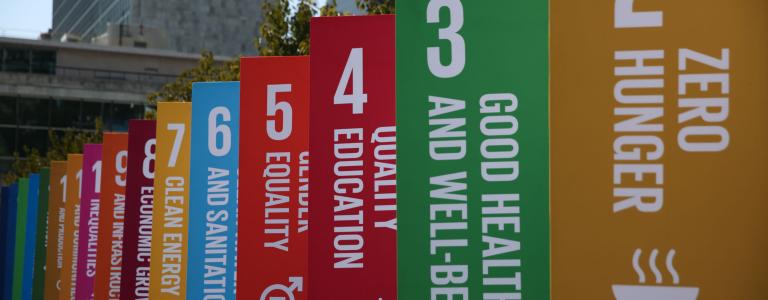Measuring the SDGs: Data practices, challenges, and futures
The growing turn to data as a means of knowing and governing global problems requires a multidisciplinary and cross-sectoral dialogue. This round table event brings together key representatives from international organizations, academia, and civil society to reflect on the practices, challenges, and futures of the Sustainable Development Goal data system.
The Sustainable Development Goals (SDGs) represent a tremendous challenge for National Statistical Offices that are unable to meet the data demands of the SDG infrastructure. Far more complex and four times more expansive than the Millennium Development Goals data infrastructure, the SDG framework comprises 232 unique indicators, and for many of these, little if any data presently exists. According to some recent estimates, not a single country is able to provide data on every indicator, and most countries are able to provide one or more data points on only 55% of the indicators.
As noted in the 2022 United Nations Sustainable Development Goals Report, most SDG data remains aggregated, making it difficult to assess the experience of vulnerable groups and ensure no one is left behind. More than just a matter of statistical capacity then, missing data can result in rendering certain issues and segments of the world population effectively invisible, thereby cutting them out of policy-making processes.
In light of these data gaps, the United Nations has underscored the need to strengthen national statistical capacity while endorsing the potential value of alternative unofficial data sources, such as big data, geospatial data, and citizen-generated data, in tracking SDG progress. More than just a technical matter, building the data capacity of the United Nations and global governance structures as a whole will necessarily raise new political and ethical dilemmas, notably around questions of transparency, accountability, privacy, and inequality.
The growing turn to data as a means of knowing and governing global problems requires a multidisciplinary and cross-sectoral dialogue. As a first exercise to consolidate a multistakeholder forum in International Geneva working in and around these critical themes, this round table event brings together key representatives from international organizations, academia, and civil society to reflect on the practices, challenges, and futures of the SDG data system.
Introductory Remarks
- Monique J. Beerli, Executive Director of the Global Governance Centre, Geneva Graduate Institute
Roundtable Panelists
- Anu Peltola, Acting Director of Statistics at the United Nations Conference on Trade and Development (UNCTAD)
- Steve MacFeely, Director of Data and Analytics at the World Health Organization (WHO)
- Moira Faul, Executive Director and Researcher at Network for International Policies and Cooperation in Education and Training (NORRAG)
- Claire Melamed, CEO of the Global Partnership for Sustainable Development Data
- Vincenzo Chiochia, Director and Head of AI Insights and Engagement at Deloitte Switzerland
Co-Moderators
- Trine Schmidt, Policy Advisor at the International Institute for Sustainable Development (IISD) and the SDG Lab
- Monique J. Beerli
Upcoming events
Building Bridges: The State of Nature-Based Investments
Join us for a panel at the Building Bridges conference in Geneva, Switzerland, to discuss the state-of-play of nature-based investments and the potential opportunities they present.
Through Her Lens: Women leading change in sustainable agriculture and market inclusion
Despite the critical role that women play in agricultural production, they still do not have equal access to global agricultural supply chains on terms that benefit them.
The Pivotal Role of Sustainability for Ukraine’s Reconstruction
This webinar, hosted by the International Institute for Sustainable Development and the Ukrainian Climate Office, will discuss how to incorporate sustainability into Ukraine's recovery and reconstruction plans and share recommendations for implementation.
A Municipal Perspective on the Value of Natural Infrastructure
This webinar will showcase examples the cost-effectiveness of natural infrastructure from a municipal perspective. Focusing on what municipalities need—what evidence and numbers they rely on, and what tools and planning processes are required to ensure that natural infrastructure is assessed alongside traditional infrastructure for cost-effectiveness.
